
Joseph Leo Mankiewicz was an American film director, screenwriter, and producer. Mankiewicz had a long Hollywood career, and won both the Academy Award for Best Director and the Academy Award for Best Adapted Screenplay in consecutive years for A Letter to Three Wives (1949) and All About Eve (1950), the latter of which was nominated for 14 Academy Awards and won six.
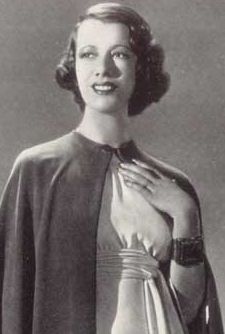
Alice Joséphine Pons, known professionally as Lily Pons, was a French-American operatic lyric coloratura soprano and actress who had an active career from the late 1920s through the early 1970s. As an opera singer, she specialized in the coloratura soprano repertoire and was particularly associated with the title roles in Lakmé and Lucia di Lammermoor. In addition to appearing as a guest artist with many opera houses internationally, Pons enjoyed a long association with the Metropolitan Opera in New York City, where she performed nearly 300 times between 1931 and 1960.

John Howard was an American actor. He is best remembered for his roles in the films Lost Horizon (1937) and The Philadelphia Story (1940).
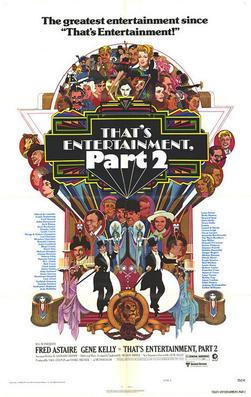
That's Entertainment, Part II is a 1976 American compilation film released by Metro-Goldwyn-Mayer and a sequel to That's Entertainment! (1974). Like the previous film, That's Entertainment, Part II was a retrospective of famous films released by MGM from the 1930s to the 1950s. Some posters for the film use Part 2 rather than Part II in the title.
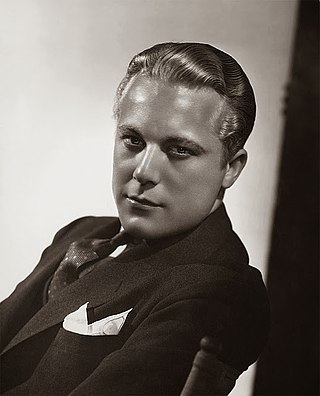
Gene Raymond was an American film, television, and stage actor of the 1930s and 1940s. In addition to acting, Raymond was also a singer, composer, screenwriter, director, producer, and decorated military pilot.

The Toast of New York is a 1937 American biographical film directed by Rowland V. Lee and starring Edward Arnold, Cary Grant, Frances Farmer, and Jack Oakie. The film is a fictionalized account of the lives of financiers James Fisk and Edward S. Stokes. The screenplay was based on the book The Book of Daniel Drew by Bouck White and the story "Robber Barons" by Matthew Josephson.

Street Girl is a 1929 pre-Code musical film directed by Wesley Ruggles and starring Betty Compson, John Harron and Jack Oakie. It was adapted by Jane Murfin from "The Viennese Charmer", a short story by William Carey Wonderly. While it was the first film made by RKO Radio Pictures, its opening was delayed until after Syncopation, making it RKO's second release. It was very successful at the box office, accounting for almost half of RKO's profits for the entire year.
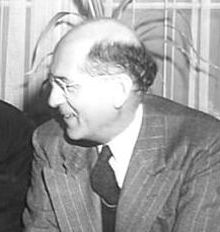
Albert E. Lewis was a Polish-born Broadway and film producer. His family emigrated to the Lower East Side of Manhattan, New York when he was a boy. He became a vaudeville comedian, then started a partnership producing one-act plays for vaudeville. Around 1930 he moved to Hollywood and worked as a film producer with Paramount, RKO, and MGM until after World War II.

Hit the Deck is a 1930 American pre-Code musical film directed by Luther Reed and starring Jack Oakie and Polly Walker, with Technicolor sequences. It was based on the 1927 musical Hit the Deck, which was itself based on the 1922 play Shore Leave by Hubert Osborne. It was one of the most expensive productions of RKO Radio Pictures up to that time, and one of the most expensive productions of 1930. This version faithfully reproduced the stage version of the musical.
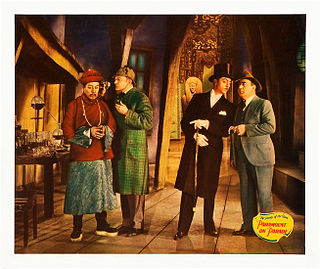
Paramount on Parade is a 1930 all-star American pre-Code revue released by Paramount Pictures, directed by several directors including Edmund Goulding, Dorothy Arzner, Ernst Lubitsch, Rowland V. Lee, A. Edward Sutherland, Lothar Mendes, Otto Brower, Edwin H. Knopf, Frank Tuttle, and Victor Schertzinger—all supervised by the production supervisor, singer, actress, and songwriter Elsie Janis.

Hitting a New High is a 1937 American musical comedy film directed by Raoul Walsh. It stars Lily Pons and Jack Oakie. It was nominated for an Academy Award in 1938 in the category Best Sound Recording.
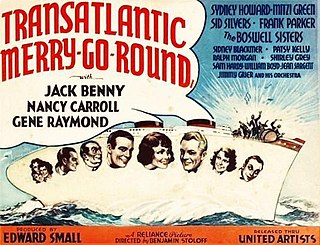
Transatlantic Merry-Go-Round is a 1934 American drama film with musical and comedic elements, directed by Benjamin Stoloff.

Super-Sleuth is a 1937 American mystery comedy film directed by Ben Stoloff. It was an early lead role for Jack Oakie. Super Sleuth was a remade in 1946 as Genius at Work, with comedy team of Wally Brown and Alan Carney.

Champagne Waltz is a 1937 American comedy film directed by A. Edward Sutherland and starring Gladys Swarthout, Fred MacMurray and Jack Oakie. It is one of five movies produced by Paramount in the 1930s featuring Swarthout, a very popular Metropolitan Opera mezzo-soprano. The studio was attempting to build on the popularity of Grace Moore, another opera singer, who had also expanded her talents into movies. The film's sets were designed by the art director Ernst Fegté working with Hans Dreier. The costume designer was Travis Banton.
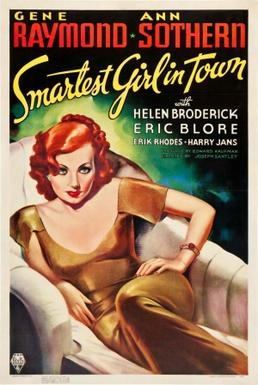
Smartest Girl in Town is a 1936 American comedy film directed by Joseph Santley, written by Viola Brothers Shore, and starring Gene Raymond, Ann Sothern, Helen Broderick, Eric Blore, Erik Rhodes and Harry Jans. It was released on November 27, 1936, by RKO Pictures.
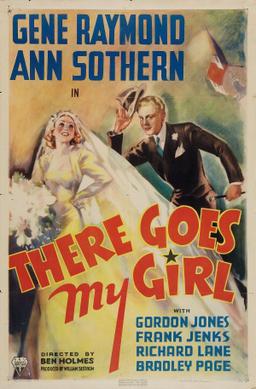
There Goes My Girl is a 1937 American comedy film directed by Ben Holmes, written by Harry Segall, and starring Gene Raymond, Ann Sothern, Gordon Jones, Richard Lane, Frank Jenks and Bradley Page. It was released on May 21, 1937, by RKO Pictures.
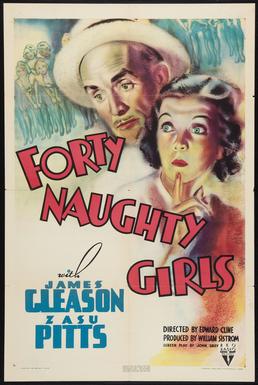
Forty Naughty Girls is a 1937 American comedy mystery film directed by Edward F. Cline and written by John Grey. The film stars James Gleason, ZaSu Pitts, Marjorie Lord, George Shelley and Joan Woodbury. It is the sixth and final entry in RKO Pictures' series of Hildegarde Withers films. This film was the sixth film in the Hildegarde Withers-Oscar Piper series, and the second film in which ZaSu Pitts appeared as Hildegarde. Before Pitts, Edna May Oliver and Helen Broderick had played the role.
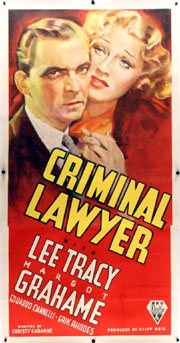
Criminal Lawyer is a 1937 American drama film directed by Christy Cabanne from a screenplay by G. V. Atwater and Thomas Lennon, based on a story by Louis Stevens. The film stars Lee Tracy, Margot Grahame and Eduardo Ciannelli. RKO produced the film and premiered it on January 26, 1937, in New York City, with a national release a few days later on January 29. It was the second time Stevens' story had been used for a film, the first being 1932's State's Attorney, starring John Barrymore and Helen Twelvetrees, directed by George Archainbaud, and also produced and released by RKO.
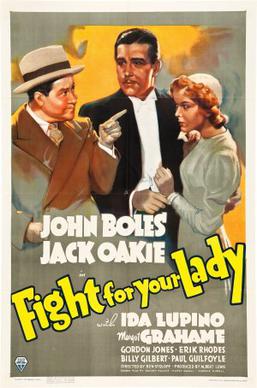
Fight for Your Lady is a 1937 American comedy film directed by Benjamin Stoloff and written by Ernest Pagano, Harry Segall and Harold Daniel Kusel. The film stars John Boles, Jack Oakie, Ida Lupino, Margot Grahame, Gordon Jones, Erik Rhodes, Billy Gilbert and Paul Guilfoyle. The film was released on November 5, 1937, by RKO Pictures.

Shoot the Works is a 1934 American pre-Code comedy film directed by Wesley Ruggles and written by Claude Binyon, Gene Fowler, Howard J. Green and Ben Hecht. It is based on the Gene Fowler and Harold Hecht 1932 play The Great Magoo. The film stars Jack Oakie, Ben Bernie, Dorothy Dell, Alison Skipworth, Roscoe Karns, Arline Judge and William Frawley. The film was released on June 29, 1934, by Paramount Pictures, preceding by two days the beginning of the most rigorously enforced version of the Hollywood Production Code, which came into effect on July 1, 1934.




















